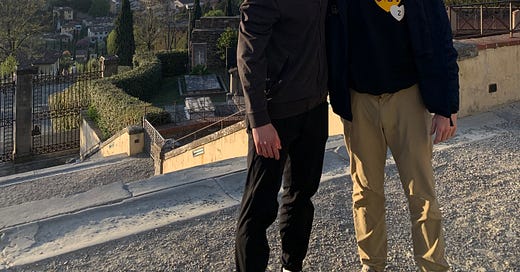Why did the Renaissance happen in Florence?
To figure out what made Florence special, you have to look beneath the surface
Hello from Florence! After a few days in Rome, Chris and I traded Marcus Aurelius for Michelangelo and trained to The City of Lilies. (Much to my historical delight, this train did not run on time. Somewhere Mussolini is rolling over in his grave.) This city was an AP Art History class come to life, but I couldn’t help but wonder why it all happened here and not anywhere else…
Florence was not what I expected.
I’ve never taken any art history classes, but even my uncultured self knew the story of art runs through Florence. It was in Florence that Renaissance artists revolutionized what art could be, so much so that Louvre took their paintings and the Ninja Turtles took their names. And this culture-bending revolution all of this spun out of this one little Italian city I now found myself in.
Having just come from Rome and Venice, I think my expectations were a bit, shall I say, tangible. The unique character of both cities are quite literally in your face, whether it’s the gravitas of the Colosseum or the novelty of a Water Taxi.
But Florence is a little more subtle. Sure, it has its opulent palace, sprawling parks, open-air markets, and a flowing river. But dozens of European cities could be described this way -- Prague, Vienna, and Copenhagen, just to name a few. At first glance, I couldn’t tell what made Florence so unusual.
Why did the Renaissance happen in Florence?
Florence may have a lot in common with other cities, but it’s the only one called “The Jewel of the Renaissance.” But why did the Renaissance take place here instead of any other similar city?
Now, this question is much too big for me to answer in a travel blog, but thankfully other historians have already spent years researching it. For example, in her book The Map of Knowledge, British historian Violent Møller found that scholarship and arts flourish in societies (like Florence) with strong political stability, a strong economy, and “an atmosphere of tolerance and inclusivity.” In other words, Florence was special because of its politics, economy, and tolerance. There are MANY more factors that led to the Renaissance in Florence, but today I’ll focus on just these three.
Florence had these three things in spades. First, politics. Famously, the Medici family rose to rule Florence while becoming one of Italy’s richest and most influential families. Under their rule, Florence avoided war and prospered as a hub for trade. This brings us to the second factor: money. As Florence grew rich, so did the Medicis. But they didn’t hoard their money. Instead, they patronized and sponsored some of history’s greatest artists: Michelangelo, Botticelli, and da Vinci, just to name a few. This meant that artists could earn a living, which freed them to focus solely on their work. And they parlayed this financial independence into artistic freedom, which brings us to our final factor: tolerance. Before the Renaissance, artists were usually patronized by the Church, who expected religious works. Now, though, the Medicis held no similar expectations. Artists had more freedom to paint whatever they wanted, and this led to an explosion in creativity and style.
Lessons from the Renaissance
The Renaissance happened for a lot of reasons, but I think these three are a good start. But when you stop to think about them, they’re not all that revolutionary. With political stability, a thriving economy, and inclusivity of ideas, people didn’t have to worry about life-threatening events like war, food, or persecution. With basic necessities taken care of, artists and philosophers were free to pursue their higher callings.
So why was Florence special? It didn't have especially evocative sunsets or uniquely talented individuals. I don’t even think it just got lucky. Instead, its citizens were better set up for success.
PS - thank you to my friend and faithful reader Chris A. for asking as to whether I’m actually in the cities I’m writing about. I’m not because I’ve fallen quite far behind on writing about where I’ve been, so I write about them well after the fact. Like any good American wannabe Influencer, though, I’ve been trying to keep up a facade of pretending I’m permanently on vacation. Props to Chris for seeing me for who and where I really am.




